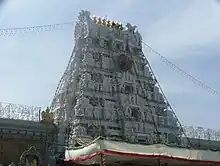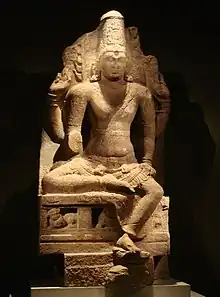Vaishnavism
Vaishnavism is a tradition of Hinduism. Its followers worship Vishnu or his avatars (his other forms), mainly Rama and Krishna as the highest, or original God.[1] This worship in different perspectives or historical traditions addresses God under the names of Narayana, Krishna, Vāsudeva or more often "Vishnu", and their associated avatars.[2][3] Its beliefs and practices, especially the concepts of Bhakti and Bhakti Yoga, are based largely on the Upanishads, and associated with the Vedas and Puranic texts such as the Bhagavad Gita, and the Padma, Vishnu and Bhagavata Puranas.[4][5][6][7]

| Part of a series on |
| Hinduism |
|---|
 |
|

These followers of Vaishnavism are referred to as Vaishnava(s) or Vaishnavites. A large percentage of Hindus are Vaishnavas,[8] with the vast majority living in India. Awareness, recognition, and growth of the belief has significantly increased outside of India in recent years. The Gaudiya Vaishnava branch[9] of the tradition has significantly increased the awareness of Vaishnavism internationally, since the mid-1900s, largely through the activities and geographical expansion of the Hare Krishna movement, primarily through ISKCON and more recently, through several other Vaishnava organizations conducting preaching activities in the West.[10]
References
- Goswami, B.K. (1965). The Bhakti Cult in Ancient India. Chowkhamba Sanskrit Series Office.
- Matchett, Freda (2000). Krsna, Lord or Avatara? the relationship between Krsna and Visnu: in the context of the Avatara myth as presented by the Harivamsa, the Visnupurana and the Bhagavatapurana. Surrey: Routledge. p. 254. ISBN 0-7007-1281-X. p. 4
- Page 1–Ramanuja and Sri Vaisnavism Archived 2008-02-25 at the Wayback Machine "In general, the Vaisnava Agamas describe Vishnu is the Supreme Being and the foundation of all existence."
- Mahony, W.K. (1987). "Perspectives on Krsna's Various Personalities". History of Religions. 26 (3): 333–335. doi:10.1086/463085. JSTOR 1062381. S2CID 164194548.
- Elkman, S.M.; Gosvami, J. (1986). Jiva Gosvamin's Tattvasandarbha: A Study on the Philosophical and Sectarian Development of the Gaudiya Vaisnava Movement. Motilal Banarsidass Pub.
- "Heart of Hinduism - Vaishnavism". Archived from the original on 2006-10-29. Retrieved 2010-01-23.
- Explanation of different scriptural texts within Hinduism
- Major Branches - Hinduism Archived 2015-03-15 at the Wayback Machine from adherents.com
- Dimock Jr, E.C. (1963). "Doctrine and Practice among the Vaisnavas of Bengal". History of Religions. 3 (1): 106–127. doi:10.1086/462474. JSTOR 1062079. S2CID 162027021.
- Contemporary Theological Trends in the Hare Krishna Movement Archived 2008-05-11 at the Wayback Machine "Until the last fifteen years or so, there had been a lack of scholarship in the West on Vaishnavism, and this was seen by Hare Krishna devotees as a situation which must be changed."